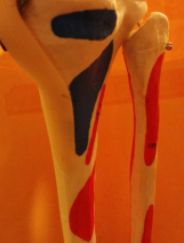Pilot study on recalcitrant shin splints
Curtin M, Crisp T, Malliaras P, Padhiar N. The effectiveness of prolotherapy in the management of recalcitrant medial tibial stress syndrome: a pilot study. Br J Sports Med 2011;45:e1 doi:10.1136/bjsm.2010.081554.8
Dr. Reeves' Notes: Shin splints or medial tibial stress syndrome (MTSS) refers to pain along or just behind the shins with sports that use the muscles in the lower leg repetitively. Ten to fifteen percent of running injuries are shin splints. This was a small pilot study of seven consecutive patients who received injection of 15% dextrose solution via a 22gauge needle with 1 ml injection per centimeter along the boney area of pain. This was injection just under the membrane lining the surface of the bone. These subjects had failed other treatments. Response was quite encouraging and a further larger study is recommended.
ABSTRACT
Objective: To study the effectiveness of dextrose prolotherapy in the treatment of recalcitrant medial tibial stress syndrome (MTSS).
Design: A prospective case-series.
Setting: A London private hospital.
Participants: Seven patients: five male and two female; (mean age=36 years+4 months) referred to a specialist tertiary referral centre having failed existing care pathways for MTSS.
Intervention: Subjects received a subperiosteal injection containing 15% dextrose solution via a BD spinal needle 22GA 3.5 IN (0.7x90 mm) under ultrasound guidance. Typically a 1 ml volume of the dextrose solution was injected per centimetre of symptomatic area of the tibia using a 20 ml syringe, giving set and three-way tap.
Study period: 11/2009 - 7/2010
Main outcome measures: Subjects completed a visual analogue scale (VAS) for average pain (where 10=severe pain and 0=no pain). Scores recorded at baseline, 1, 2 and 4 weeks postinjection and again during telephone follow-up (mean 18 weeks, range 13-36 weeks). Subjects were also reviewed at least once in a follow-up appointment where they also completed a symptom diary. At final telephone follow-up they completed a six-point Likert global improvement scale, and a five-point activity scale.
Results: All subjects reported a marked improvement in their symptoms. There was a significant decrease in mean average pain measured by VAS scores at 4 weeks (p <0.05) and 18 weeks (p<0.05) compared to baseline. The median VAS average pain score improvement per subject was 4/10. The median change in activity value at 18 week postinjection follow-up was a score of 4.0 representing a return to a desired level of sport but not to preinjury level. The median Likert global improvement score at 18 weeks postinjection follow-up was 2.0 which represented `much improved' on a six-point scale. There were no adverse events.
Conclusions: Dextrose prolotherapy injection resulted in tangible symptom improvement in seven patients with painful recalcitrant MTSS. Controlled trials of this intervention are warranted.
Curtin M, Crisp T, Malliaras P, Padhiar N. The effectiveness of prolotherapy in the management of recalcitrant medial tibial stress syndrome: a pilot study. Br J Sports Med 2011;45:e1 doi:10.1136/bjsm.2010.081554.8
Dr. Reeves' Notes: Shin splints or medial tibial stress syndrome (MTSS) refers to pain along or just behind the shins with sports that use the muscles in the lower leg repetitively. Ten to fifteen percent of running injuries are shin splints. This was a small pilot study of seven consecutive patients who received injection of 15% dextrose solution via a 22gauge needle with 1 ml injection per centimeter along the boney area of pain. This was injection just under the membrane lining the surface of the bone. These subjects had failed other treatments. Response was quite encouraging and a further larger study is recommended.
ABSTRACT
Objective: To study the effectiveness of dextrose prolotherapy in the treatment of recalcitrant medial tibial stress syndrome (MTSS).
Design: A prospective case-series.
Setting: A London private hospital.
Participants: Seven patients: five male and two female; (mean age=36 years+4 months) referred to a specialist tertiary referral centre having failed existing care pathways for MTSS.
Intervention: Subjects received a subperiosteal injection containing 15% dextrose solution via a BD spinal needle 22GA 3.5 IN (0.7x90 mm) under ultrasound guidance. Typically a 1 ml volume of the dextrose solution was injected per centimetre of symptomatic area of the tibia using a 20 ml syringe, giving set and three-way tap.
Study period: 11/2009 - 7/2010
Main outcome measures: Subjects completed a visual analogue scale (VAS) for average pain (where 10=severe pain and 0=no pain). Scores recorded at baseline, 1, 2 and 4 weeks postinjection and again during telephone follow-up (mean 18 weeks, range 13-36 weeks). Subjects were also reviewed at least once in a follow-up appointment where they also completed a symptom diary. At final telephone follow-up they completed a six-point Likert global improvement scale, and a five-point activity scale.
Results: All subjects reported a marked improvement in their symptoms. There was a significant decrease in mean average pain measured by VAS scores at 4 weeks (p <0.05) and 18 weeks (p<0.05) compared to baseline. The median VAS average pain score improvement per subject was 4/10. The median change in activity value at 18 week postinjection follow-up was a score of 4.0 representing a return to a desired level of sport but not to preinjury level. The median Likert global improvement score at 18 weeks postinjection follow-up was 2.0 which represented `much improved' on a six-point scale. There were no adverse events.
Conclusions: Dextrose prolotherapy injection resulted in tangible symptom improvement in seven patients with painful recalcitrant MTSS. Controlled trials of this intervention are warranted.
